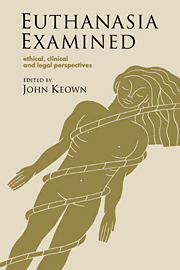Book contents
- Frontmatter
- Contents
- List of contributors
- Acknowledgements
- Foreword by Daniel Callahan
- Introduction
- 1 Euthanasia and the value of life
- 2 A philosophical case against euthanasia
- 3 The philosophical case against the philosophical case against euthanasia
- 4 The fragile case for euthanasia: a reply to John Harris
- 5 Final thoughts on final acts
- 6 Misunderstanding the case against euthanasia: response to Harris's first reply
- 7 Euthanasia: back to the future
- 8 The case for legalising voluntary euthanasia
- 9 Extracts from the Report of the House of Lords Select Committee on Medical Ethics
- 10 Walton, Davies, Boyd and the legalization of euthanasia
- 11 Where there is hope, there is life: a view from the hospice
- 12 Letting vegetative patients die
- 13 A case for sometimes tube-feeding patients in persistent vegetative state
- 14 Dilemmas at life's end: a comparative legal perspective
- 15 Physician-assisted suicide: the last bridge to active voluntary euthanasia
- 16 Euthanasia in the Netherlands: sliding down the slippery slope?
- 17 Advance directives: a legal and ethical analysis
- 18 Theological aspects of euthanasia
- Index
4 - The fragile case for euthanasia: a reply to John Harris
Published online by Cambridge University Press: 03 May 2010
- Frontmatter
- Contents
- List of contributors
- Acknowledgements
- Foreword by Daniel Callahan
- Introduction
- 1 Euthanasia and the value of life
- 2 A philosophical case against euthanasia
- 3 The philosophical case against the philosophical case against euthanasia
- 4 The fragile case for euthanasia: a reply to John Harris
- 5 Final thoughts on final acts
- 6 Misunderstanding the case against euthanasia: response to Harris's first reply
- 7 Euthanasia: back to the future
- 8 The case for legalising voluntary euthanasia
- 9 Extracts from the Report of the House of Lords Select Committee on Medical Ethics
- 10 Walton, Davies, Boyd and the legalization of euthanasia
- 11 Where there is hope, there is life: a view from the hospice
- 12 Letting vegetative patients die
- 13 A case for sometimes tube-feeding patients in persistent vegetative state
- 14 Dilemmas at life's end: a comparative legal perspective
- 15 Physician-assisted suicide: the last bridge to active voluntary euthanasia
- 16 Euthanasia in the Netherlands: sliding down the slippery slope?
- 17 Advance directives: a legal and ethical analysis
- 18 Theological aspects of euthanasia
- Index
Summary
The notable differences between John Harris's essay (chapter i) and his earlier writings suggest the fragility of the grounds he offers for abandoning our deeply meditated traditions and embracing euthanasia. The ground he marks out is indeed shifting.
‘INDIVIDUAL’
Harris's definition of euthanasia, and much of his discussion, employs the term ‘individual’. The theme of our exchange, of course, is not abortion. But it would be wrong to overlook his essay's striking assertion that ‘the individual can be said to have come into existence when the egg is first differentiated or the sperm that will fertilise that egg is first formed’. Contrast this with chapter i of The Value of Life (often cited in the essay), where Harris maintained that ‘fertilisation does not result in an individual even of any kind’ and that ‘the emergence of the individual occurs gradually’, after conception.
In 1985, Harris had two arguments for denying that a human individual begins at conception: that the ‘fertilised egg’ (i.e. the early embryo) will divide into two elements (the embryo proper, as distinct from the placenta and related tissues), and that some early embryos split to form twins. Both those arguments are quite inadequate bases for denying what the definite article in the otherwise tendentious phrase ‘the fertilised egg’ bears witness to: that from conception there is at all stages an individual organic entity.
- Type
- Chapter
- Information
- Euthanasia ExaminedEthical, Clinical and Legal Perspectives, pp. 46 - 55Publisher: Cambridge University PressPrint publication year: 1995
- 1
- Cited by

